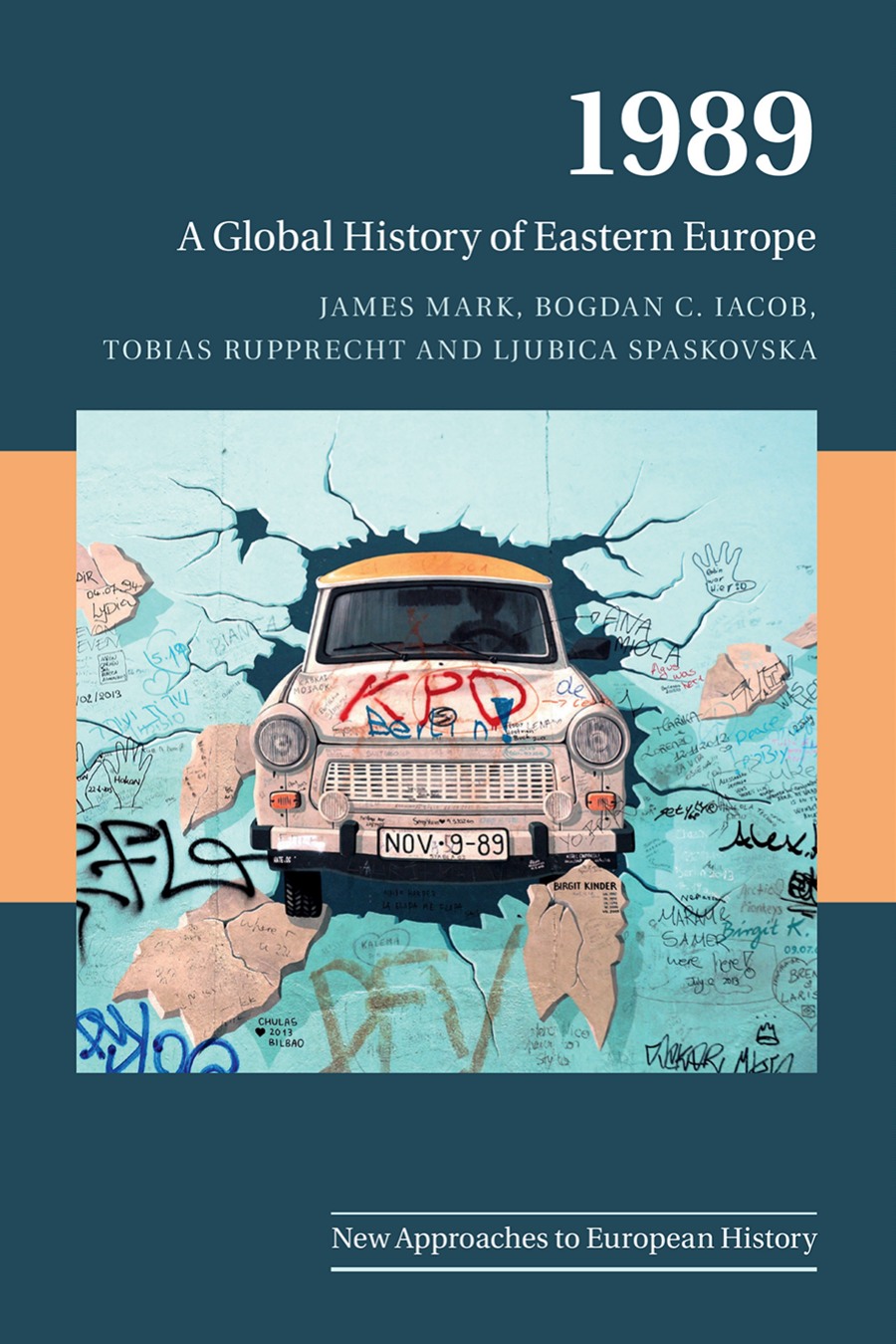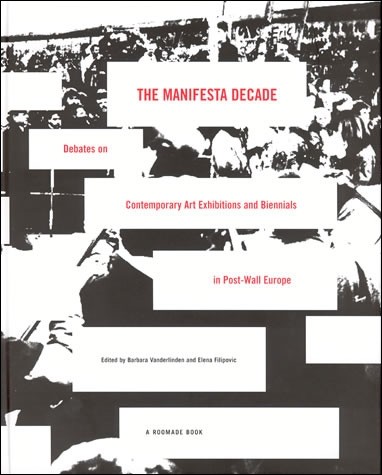James Mark, Bogdan C. Iacob, Tobias Rupprecht, Ljubica Spaskovska: 1989: A Global History of Eastern Europe (2019)
Filed under book | Tags: · 1989, authoritarianism, capitalism, central europe, communism, democracy, eastern europe, europe, european union, globalisation, history, human rights, illiberalism, internationalism, liberalism, market, migration, nationalism, neoliberalism, politics, post-communism, refugees, socialism, southeastern europe, soviet union, transition

“The collapse of the Berlin Wall has come to represent the entry of an isolated region onto the global stage. On the contrary, this study argues that communist states had in fact long been shapers of an interconnecting world, with ‘1989’ instead marking a choice by local elites about the form that globalisation should take. Published to coincide with the thirtieth anniversary of the 1989 revolutions, this work draws on material from local archives to international institutions to explore the place of Eastern Europe in the emergence, since the 1970s, of a new world order that combined neoliberal economics and liberal democracy with increasingly bordered civilisational, racial and religious identities. An original and wide-ranging history, it explores the importance of the region’s links to the West, East Asia, Africa, and Latin America in this global transformation, reclaiming the era’s other visions such as socialist democracy or authoritarian modernisation which had been lost in triumphalist histories of market liberalism.”
Publisher Cambridge University Press, Cambridge, UK, 2019
New Approaches to European History series, 59
ISBN 9781108427005, 1108427006
vii+372 pages
Reviews: Árpád von Klimo (H-Diplo, 2020), Tilmann Siebeneichner (German History, 2020), Nick Ostrum (Europe Now, 2020),
Interviews with co-author (James Mark): Ondřej Bělíček (A2larm, CZ, 2019), Ondřej Bělíček (Jacobin, 2020), Ronaldas Galinis (LRT.lt, 2020), Rūta Miškinytė (15min.lt, 2020, LT), Zoltán Ginelli (LeftEast, 2020, Part 2, Part 3).
Book summary (Eurozine, 2019).
Project website
Publisher
WorldCat
Marina Gržinić (ed.): Border Thinking: Disassembling Histories of Racialized Violence (2018)
Filed under book | Tags: · borders, europe, immigration, migration, necropolitics, politics, race, racialization, racism, refugees

“Border Thinking: Disassembling Histories of Racialized Violence aims to question and provide answers to current border issues in Europe. Central to this investigation is a refugee crisis that is primarily a crisis of global Western capitalism and its components: modernization, nationalism, structural racism, dispossession, and social, political, and economic violence.
In this volume, these notions and conditions are connected with the concept of borders, which seems to have disappeared as a function of the global neoliberal economy but is palpably reappearing again and again through deportations, segregations, and war. How can we think about these relations in an open way, beyond borders? Is it possible to develop border thinking for a radical transformation, as a means to revolutionize the state of things? To do this, we must reconsider what is possible for the social and the political as well as for art and culture.”
With contributions by Ilya Budraitskis, Maira Enesi Caixeta, C.A.S.I.T.A., Yuderkys Espinosa Miñoso, Miguel González Cabezas, Marina Gržinić, Juan Guardiola, Çetin Gürer, Neda Hosseinyar, Njideka Stephanie Iroh, Adla Isanović, Fieke Jansen, Tjaša Kancler, Zoltán Kékesi, Betül Seyma Küpeli, Gergana Mineva, Musawenkosi Ndlovu, Stanimir Panayotov, Suvendrini Perera, Jelena Petrović, Khaled Ramadan, Rubia Salgado, Marika Schmiedt, Joshua Simon, Aneta Stojnić, Shirley Anne Tate, Göksun Yazıcı, Hiroshi Yoshioka.
Publisher Sternberg Press, Berlin, 2018
Publication Series of the Academy of Fine Arts Vienna, 21
ISBN 9783956793837
308 pages
via AkBild Vienna
Barbara Vanderlinden, Elena Filipovic (eds.): The Manifesta Decade: Debates on Contemporary Art Exhibitions and Biennials in Post-Wall Europe (2005)
Filed under book | Tags: · art history, contemporary art, europe, exhibition, globalisation

“Reflections from curators, historians, philosophers, anthropologists, architects, and writers on the cultural and political conditions of European exhibition practice since the fall of the Berlin Wall.
Manifesta, the first itinerant European Biennial for Contemporary Art, emerged in a post-wall, globalizing Europe. Founded in 1993, it organized traveling exhibitions aimed at providing a new framework for cultural exchange and collaboration between artists and curators from across the continent. The Manifesta Decade marks Manifesta’s ten years of exhibits with original essays, unpublished images, and texts that not only document the different Manifesta exhibits but also examine the cultural, curatorial, and political terrain of the Europe from which they sprang.
Including contributions from philosophers, historians, and anthropologists, interviews with architect Rem Koolhaas and historian Jacques Le Goff, and essays by such curators and writers as Okwui Enwezor, Boris Groys, Maria Hlavajova, and Hans Ulrich Obrist, the collection traces the cultural and political developments of Europe in the 1990s. It reflects the debates incited by exhibitions such as Magiciens de la Terre, Documenta, and After the Wall and explores the changing roles of curators and artists in the new geo-political context. The issues discussed include the effect of communism’s collapse on Eastern Europe, the role of Biennials in the context of globalization, and the ephemerality of exhibitions versus the permanence of the museum. The book’s second section traces the history of Manifesta, from its conceptual foundations and contributions to artistic practices of the 1990s to the relationship of a roving Biennial to themes of multiculturalism, migration and diaspora. At a moment when biennials continue to proliferate worldwide, The Manifesta Decade takes Manifesta as a case study to look critically at the landscape from which new exhibition paradigms have emerged. The book’s 100 images, both color and black and white, include unpublished installation shots of each Manifesta exhibition.”
Publisher MIT Press, Cambridge, MA, with Roomade, Brussels, in collaboration with the International Foundation Manifesta, Amsterdam, 2005
ISBN 9780262220767, 0262220768
337 pages
Reviews: Aaron Schuster (Frieze, 2006), Veronica Davies (Art Book, 2007), Philipp Kaiser (ARTMargins, 2008).
Comment (0)
